|
October 25, 2018
Postal Workers Begin Rotating Strikes
All Out to Support Postal Workers'
Just Demands
PDF
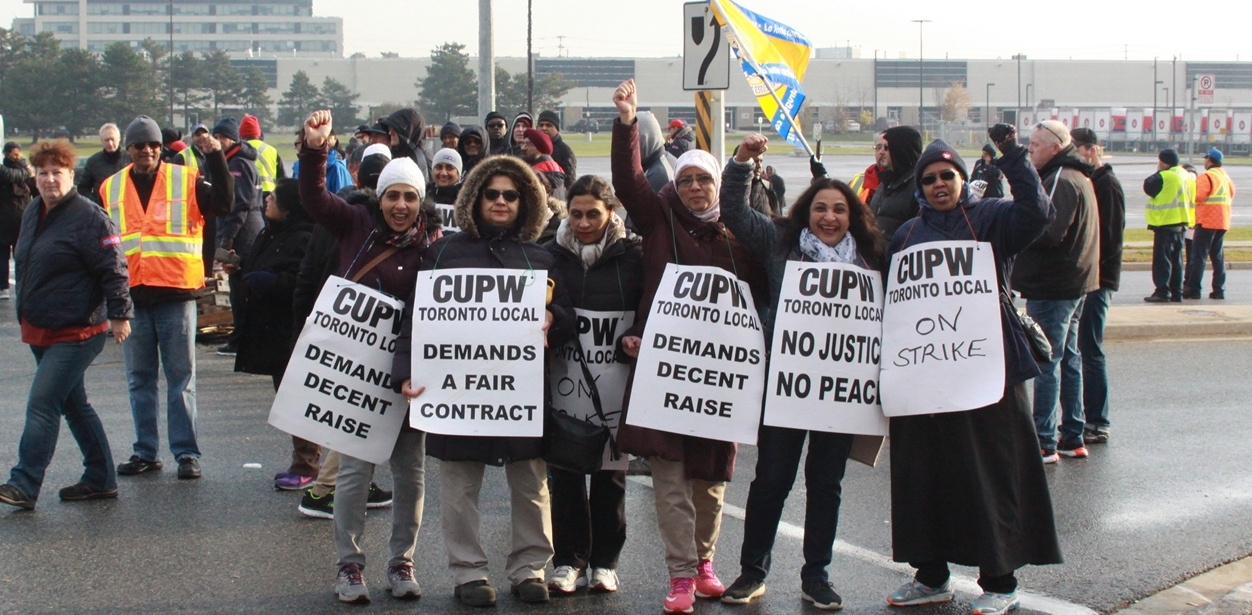
Picket line at Gateway sorting plant Mississauga, Ontario, October 23,
2018.
Postal Workers Begin Rotating Strikes
• All Out to Support Postal Workers' Just
Demands
Pensions Are a Right!
• Make Defeat of Bill C-27 the First Step
to Real Pension Security
for All - Ottawa
Committee
for Pension Security
Quebec
Workers
Defend
Rights
and
Public
Services
• Demonstration Outside National Assembly in
Defence of Public Sector Workers and Public Services
• Outaouais Nurses Continue to Organize in
Defence of Their Rights
• Montreal Transit Maintenance Workers Fight
for Working Conditions and Quality of Life - Gleason Frenette,
President, Montreal Transit Union (STM-CSN)
New Brunswick Workers
Fight for Their Rights and the Rights of All
• Need for Wage Increases to Improve
Workers' Living Conditions and Defend the People's Right to Public
Services - Interview, Daniel Légère, President,
CUPE New Brunswick
• WorkSafe NB Task Force's Anti-Worker
Recommendations on Workers' Compensation System - Interview,
Patrick Colford, President, New Brunswick Federation of Labour
Letter to the Editor
• Re: Workers' Forum Article on Pilot Fatigue
Postal Workers Begin Rotating Strikes
All Out to Support Postal Workers' Just Demands

Rural and Suburban Mail Carriers (RSMCs) picket in Nova Scotia, October
22,
2018.
On Sunday, October 21, the Canadian Union of Postal
Workers National Executive Board informed postal workers that last
minute discussions with Canada Post failed to address the demands of
the union. A bulletin to union members stated that Canada Post
negotiators refused to address the workers' demands and consequently
the
union would begin rotating strikes at 12:01 am on October 22,
in Victoria, British Columbia; Edmonton, Alberta; Windsor, Ontario; and
Halifax, Nova Scotia.
Thousands of postal workers established picket lines at
each location at 12:01 am local time. The first round of work
stoppages lasted 24 hours.
In the evening of October 22, the union announced
that workers in Toronto would begin strike action at 12:01 am
local time. Close to 9,000 postal workers in the Toronto area
walked off the job and picketed all work locations in most of the
Greater Toronto Area (excluding Scarborough) for two days.
The
union press release stated, "We need to address health and safety
concerns and precarious work, as well as gender equality. We will stay
at the bargaining table and on the picket line for as long as it takes
to get a fair deal for our members."[1]
On October 24 at 6:00 pm local time, workers in Calgary, Alberta and
Kelowna, BC went on strike. They were joined by workers in Sherbrooke,
Quebec on October 25 at 4:00 am local time.
On Wednesday, October 24, Minister of Labour Patty Hajdu
appointed Morton Mitchnick as a special mediator to assist the parties
in reaching negotiated collective agreements. The union's negotiating
committees announced that they were ready to work with the special
mediator and Peter Simpson, Director General of the Federal Mediation
and Conciliation Services to achieve the needs of postal workers in
this round of negotiations. They also made it clear that strike
activities will continue until further notice.
Workers' Forum
calls on everyone to go all out to support the postal workers' demand
for a collective agreement commensurate with their needs and the
people's need for a vital public post office.
Halifax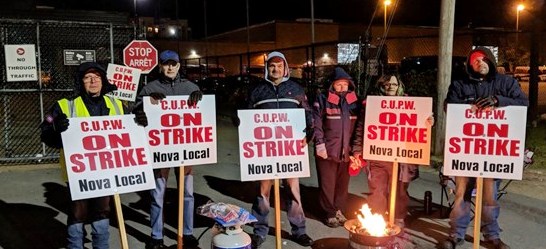 
Nova Scotia, RSMCs
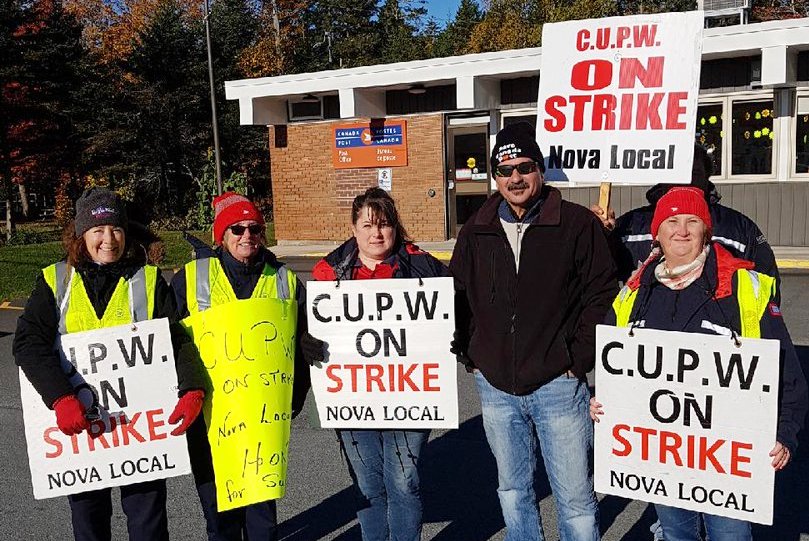 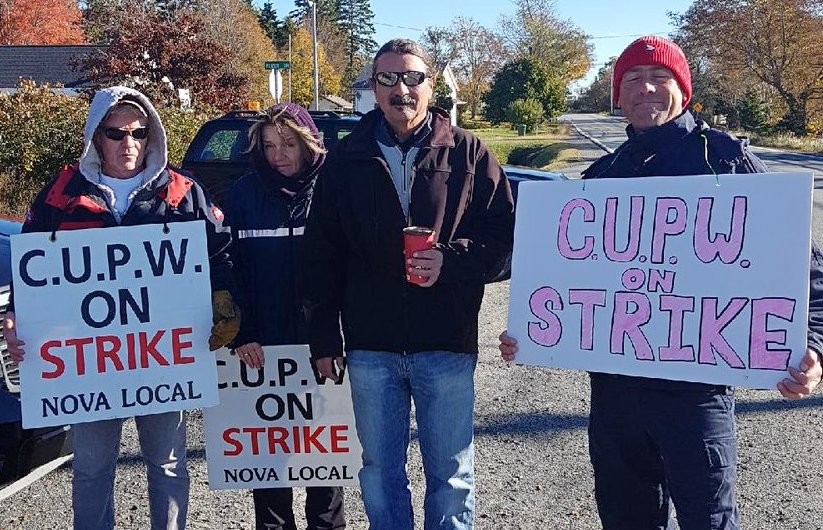
Sherbrooke, Quebec

Magog, Quebec

Solidarity action, Sudbury, Ontario

South Central Sorting plant, Toronto; Carrier Super Depot, Etobicoke
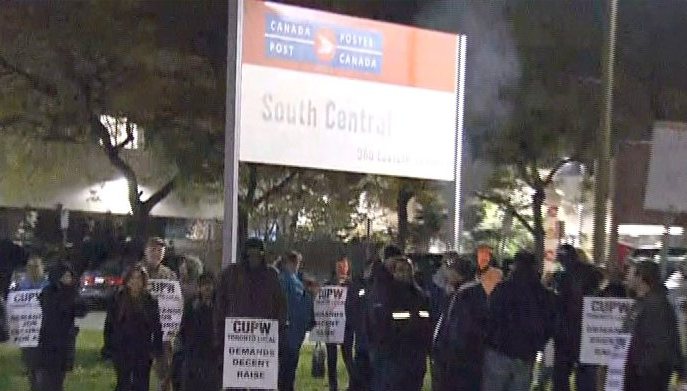 
Mississauga, Ontario
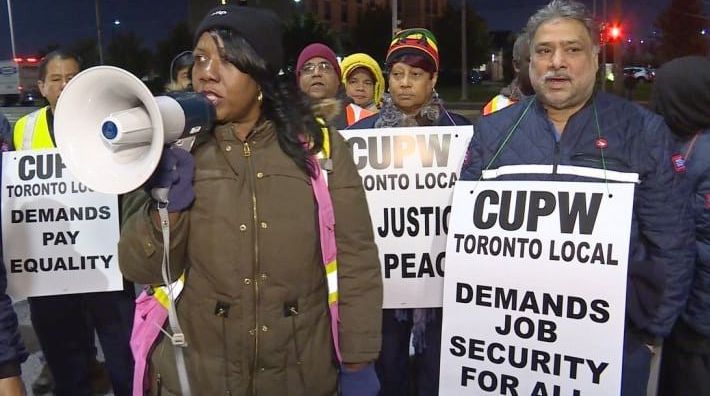 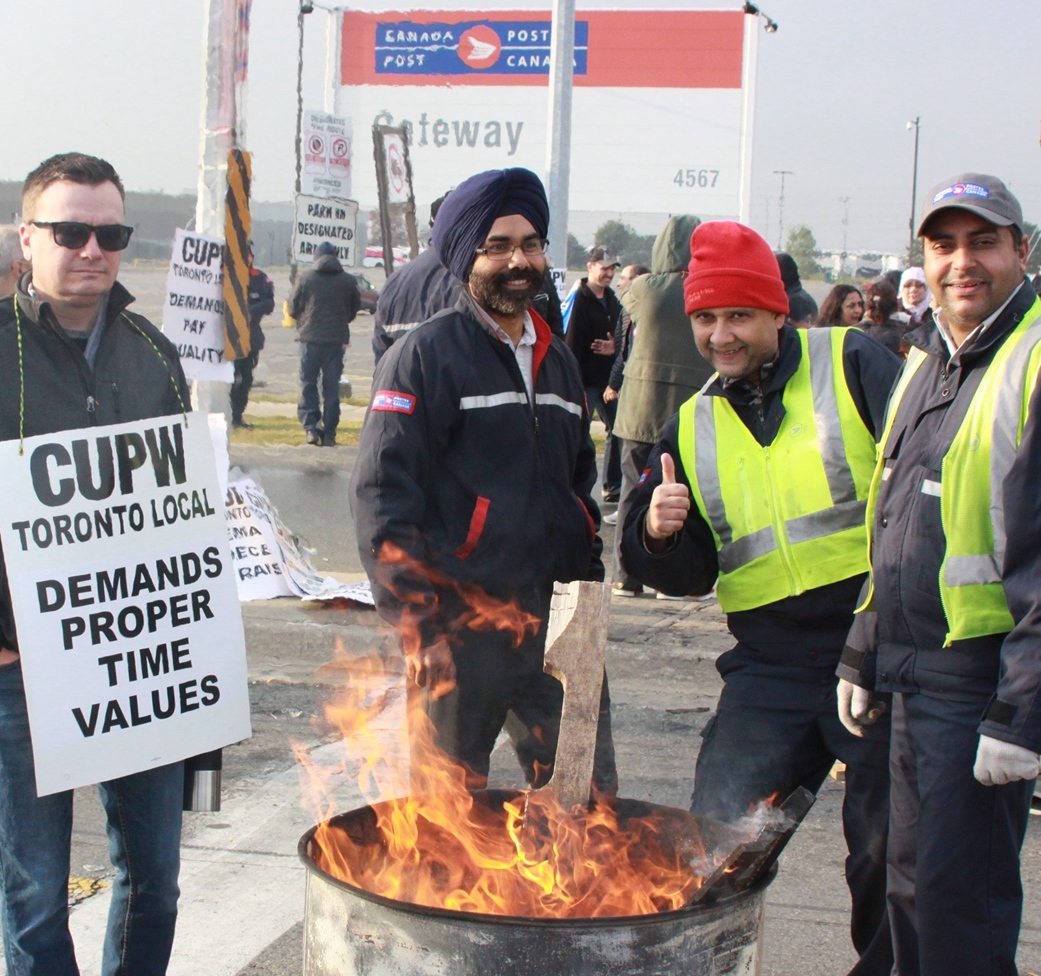

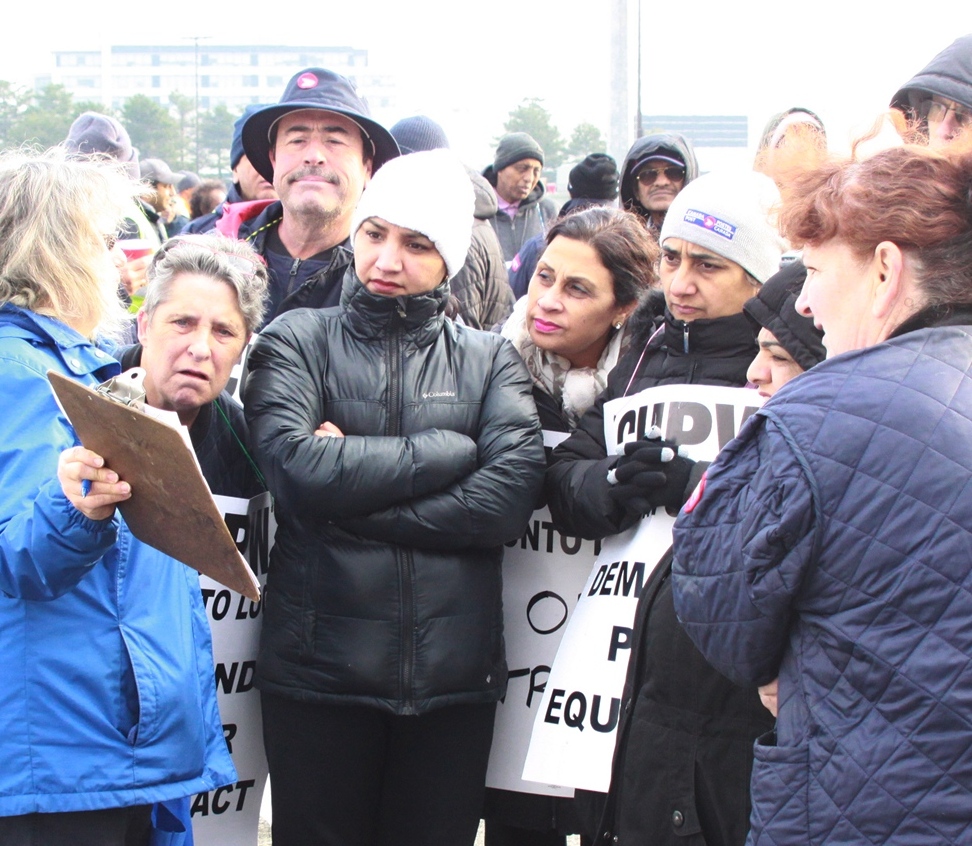 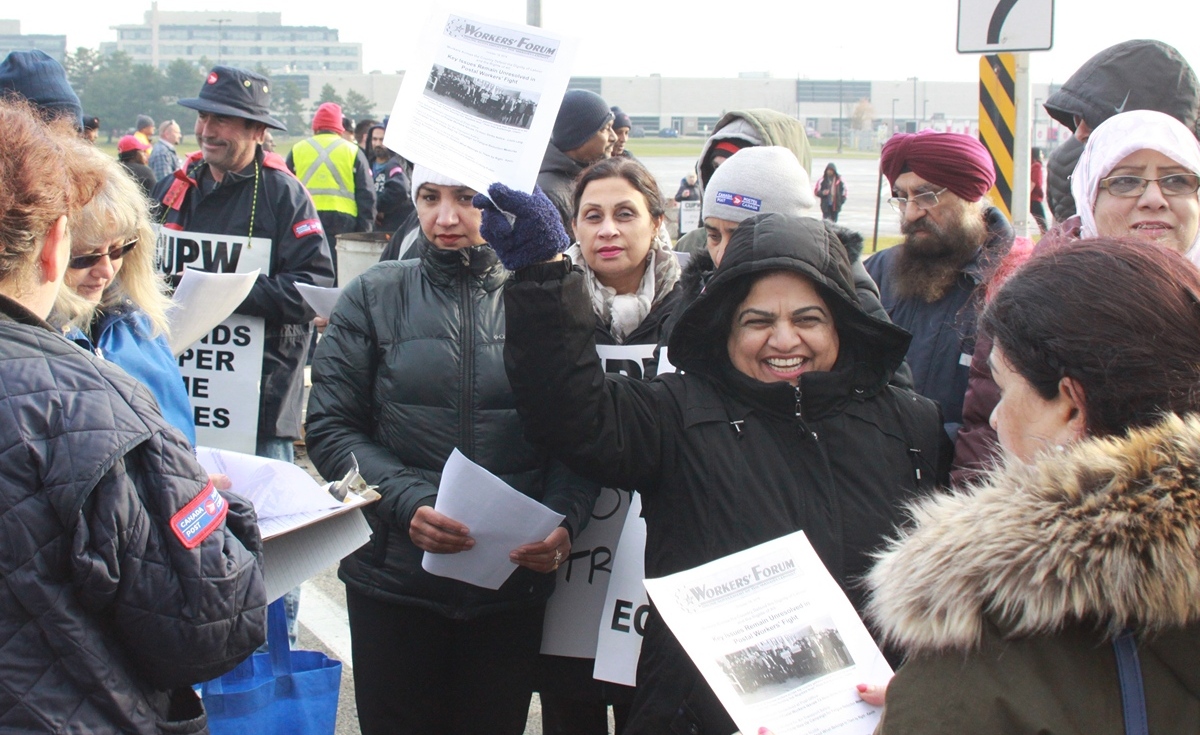
Windsor, Ontario

Tecumseh, Ontario
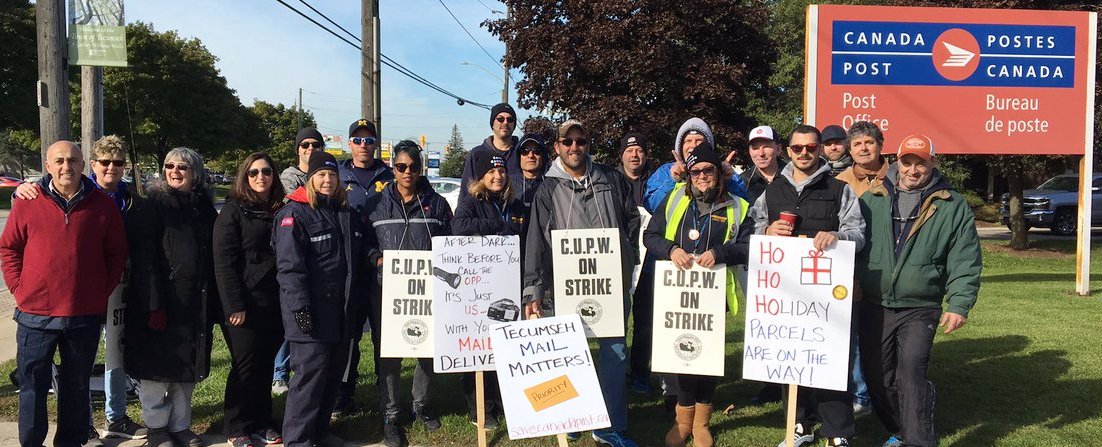
Edmonton, Alberta

Lower Mainland, BC

Victoria, BC
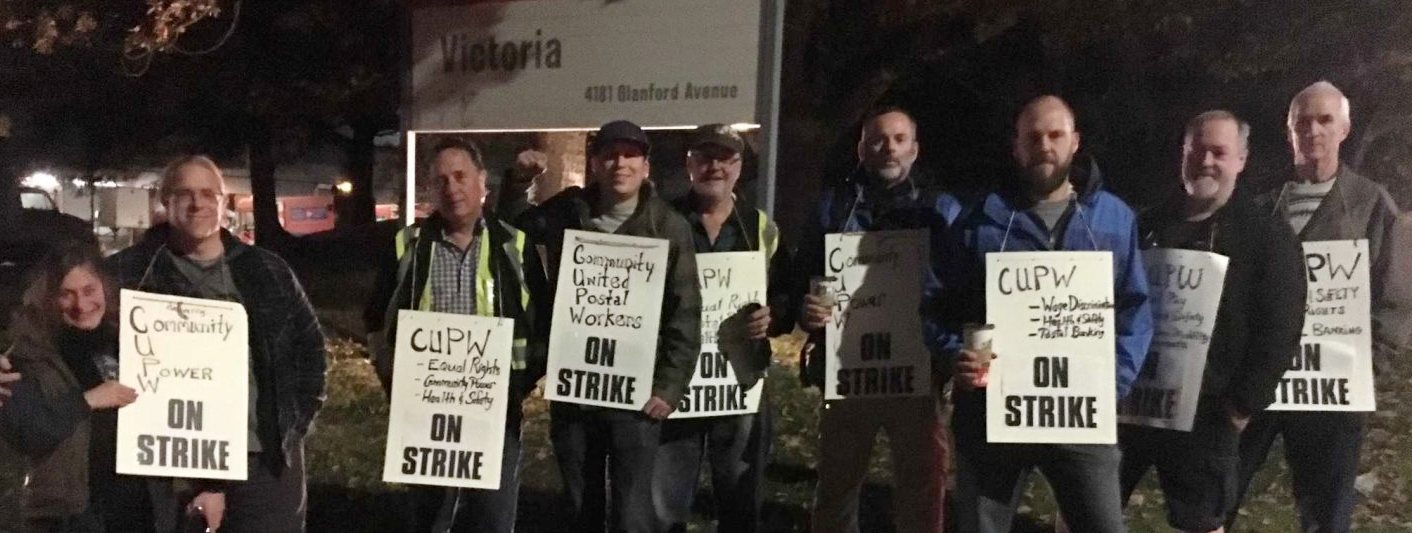
Sooke, BC; Duncan, BC
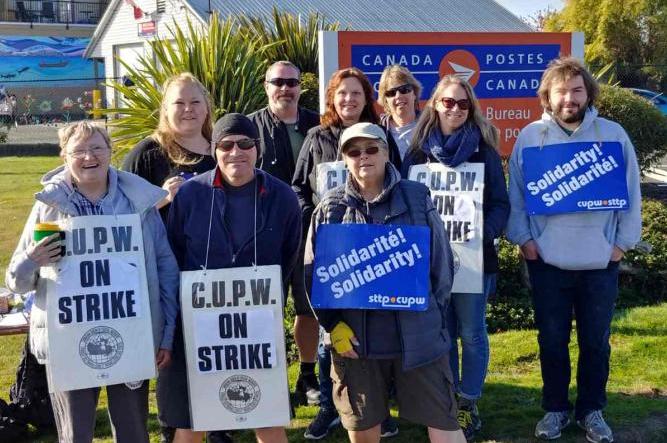 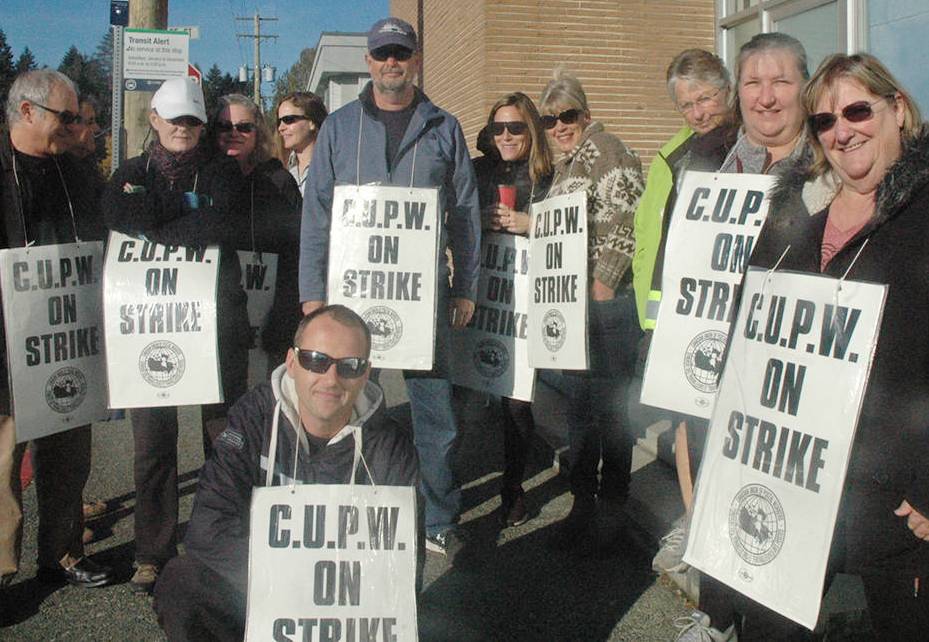
Note
1. See "Key
Issues
Remain
Unresolved
at
Post
Office:
Canadian
Union
of
Postal
Workers
Issues 72-Hour
Strike
Notice," Louis Lang, Workers'
Forum,
October 18, 2018.

Pensions Are a Right!
Make Defeat of Bill C-27 the First Step
to Real Pension Security for All
- Ottawa Committee for Pension Security -

Picket against Bill C-27 outside Finance Minister Morneau's office in
Toronto, November 28, 2017.
Prime Minister Trudeau and Finance
Minister Morneau almost got away
with it.
When the Liberal Government introduced Bill C-27 into
the House of Commons on October 19, 2016, they claimed
that the Bill was needed in order to "expand" the range of design
options for workplace pension plans in the federal jurisdiction. Having
campaigned during the 2015 election in support of strengthening
pensions and retirement income security, they wanted to convince their
supporters and Canadians in general that Bill C-27 would advance that
positive agenda.
Fortunately, the vast majority of trade unions, retiree
organizations, and committed retirement activists have spent the past
two years exposing the real agenda behind Bill C-27, which is an
employer-inspired attack on existing defined benefit pension plans.
 Those analysing the Bill
showed that its proposed amendments to the federal jurisdiction's Pension
Benefits
Standards
Act (PBSA) would permit employers sponsoring
secure "defined-benefit" type pension plans to convert them to insecure
and non-guaranteed "target-benefit" type plans -- something pension
legislation in all
jurisdictions (except New Brunswick, in certain circumstances) makes
illegal if its application includes the already-earned benefits of
retirees and long-service active workers. Rather than strengthening
protection and expanding decent pension coverage, Bill C-27 was
precisely intended to allow federal jurisdiction employers -- including
employers
like Air Canada, Canada Post, and NavCan -- to escape their legal
pension obligations with respect to their current and former (retired)
workforce. Ultimately, the framework of Bill C-27 represents a grave
threat to all defined-benefit pension plans and their members. Put
simply, while it has been "paused," and delayed, it still must be
definitively
defeated. Those analysing the Bill
showed that its proposed amendments to the federal jurisdiction's Pension
Benefits
Standards
Act (PBSA) would permit employers sponsoring
secure "defined-benefit" type pension plans to convert them to insecure
and non-guaranteed "target-benefit" type plans -- something pension
legislation in all
jurisdictions (except New Brunswick, in certain circumstances) makes
illegal if its application includes the already-earned benefits of
retirees and long-service active workers. Rather than strengthening
protection and expanding decent pension coverage, Bill C-27 was
precisely intended to allow federal jurisdiction employers -- including
employers
like Air Canada, Canada Post, and NavCan -- to escape their legal
pension obligations with respect to their current and former (retired)
workforce. Ultimately, the framework of Bill C-27 represents a grave
threat to all defined-benefit pension plans and their members. Put
simply, while it has been "paused," and delayed, it still must be
definitively
defeated.
The good news is that a strong momentum against Bill
C-27 was built. Virtually all groups representing workers affected by
the proposed changes have taken active steps to oppose it. From the
street demonstrations in Ottawa and Toronto, to mass petitions and
postcard campaigns attracting thousands of signatures, to active
lobbying and
meeting with MPs, the movement forward for this bill was stopped at
First Reading. Minister Morneau and Prime Minister Trudeau have not
moved the bill to Second Reading. The fact that Minister Morneau faced
a full investigation by the Federal Ethics Commissioner into his
conflict of interest in relation to this legislation also helped stall
the
government. The fact that the Commissioner ultimately (June 2018)
rejected that conflict of interest complaint does not, of course, mean
that he did not have a conflict -- only that the inadequate and narrow
parameters set under the Ethics Commissioner's mandate were not
breached. Today, Bill C-27 has neither been withdrawn nor pursued.
The Liberals could still move Bill C-27 forward at any time, including
immediately following the next federal elections, set for
October 2019.

Picket in Ottawa against Bill C-27, May 5, 2017.
Further, the central idea behind Bill C-27 -- which is
to remove the legal security embedded in already-promised pensions --
continues to represent a serious threat to the retirement security of
thousands of workers in Canada. At least two provincial governments
(Manitoba and Nova Scotia) have announced that they are considering
similar
legislation. Even worse, within months of C-27's introduction, the
right-wing C.D. Howe Institute published a paper (April 2017)
proposing to transform the Canada Pension Plan -- our public
defined-benefit plan covering nearly all workers in the country -- into
an insecure "target-benefit" plan. In this sense, the substance inside
Bill C-27 is
a threat to nearly all workers in Canada.
But the threat represented by Bill C-27 is not the only
threat to retirement security -- it is not even the biggest.
Ultimately, Canada's retirement income fails on the simple measure that
the great majority of Canadian workers -- over 70 per cent now --
have no secure (defined-benefit) pension plan through their job (apart
from CPP). This
leaves most of us to fend for ourselves, scraping together savings
through tax system-supported schemes like RRSPs or TFSAs -- plans that
are designed to generate profits for the financial industry, and not to
deliver income security. The Ottawa Committee for Pension Security is
convinced that we can do much better than this. We need a
transition to a comprehensive and universal pension system that builds
on the success of our vital but inadequate public pensions -- CPP and
OAS.
Canada is a wealthy country, but one that is becoming
increasingly unequal. Seniors' poverty, and economic insecurity, is
increasing again. The increasingly precarious job picture faced by
young workers now entering the labour force is even less likely to
offer a defined-benefit pension than the job market their parents
faced. The small
expansion of the CPP that was agreed to in 2016 was a positive
step -- but seriously inadequate to meet this growing need. We have the
resources and income to establish a universal pension system that would
truly meet the income needs of the retired population. But building
such a system is only going to be possible if a movement -- or
movements -- are built to demand it.
If you agree, get in touch with us! Connect with us on
Facebook, send us an email, and let's discuss how to build the kind of
movement we would need to win real pension security for everyone!
Facebook Group: Ottawa Committee for Pension Security
Twitter: @pensionsforall Email: nancy.parker59@gmail.com

Quebec Workers Defend Rights and Public
Services
Demonstration Outside National Assembly
in Defence of
Public Sector Workers
and Public Services

On October 17, some 500 public
sector workers, members of the CSN, demonstrated in front of the
National Assembly to challenge the new government on
the state of public services, following years of budget cuts. The event
was staged as the CSN held a consultation forum in Quebec City on
the next round of public sector bargaining.
The protesters testified to the significant
deterioration of their working conditions and the serious impact of the
neo-liberal austerity agenda on public services. They
demanded major investments in public services.
Speaking about the health care and social services
network, Ginette Langlois, President of the Federation of Professionals
(FP-CSN) said, "The creation of mega-facilities resulting from
institutional mergers has led to a real and unfortunate dehumanization
of services. Work is no longer the same. Professional autonomy has been
eroded. We ask
the prospective Minister of Health to take into consideration the
expertise of professionals and technicians, so that their work takes on
its full meaning." Among the problems that were raised regarding these
networks is the major shortage of personnel, created by the
deterioration of working conditions; the overload on the people still
working in the
system; and a general climate of the devaluing of work, which greatly
affects morale.
With regard to the education sector, serious concerns
were raised about the increasingly precarious working conditions for
teaching and support staff and the
increased tailoring of education and training to "market needs." The
protestors also strongly opposed the Legault government's promise to
abolish school boards,
seeing this as a step towards an anti-social restructuring of the
entire education sector similar to that of the health care sector under
the Liberals. "We do not want a Barette-style reform in education,"
asserted Nathalie Arguin, President of the Federation of Public
Services Employees (FEESP-CSN).
Before leaving the National Assembly, the demonstrators
reminded the new government that the public sector has made a
significant contribution and continues to contribute to the development
of Quebec and that workers in the education, health care and social
services networks and government agencies will be there to defend
public services in the coming months and years.


Outaouais Nurses Continue to Organize in
Defence of Their Rights

Nurses in the Outaouais are stepping up their actions
against demands for concessions by their employer, the Integrated
Health and Social Services Centre of the Outaouais (CISSSO). This is
taking place within the framework of negotiations for the renewal of
their collective agreement. Negotiations are taking place under the
umbrella of the
anti-social restructuring of the health care system that was
intensified
under the Couillard majority government.
On October 15, members of the Union of
Care Professionals of the Outaouais (SPSO) organized a sit-in in a
hallway on the seventh floor of the Gatineau Hospital, near the Human
Resources offices, to express their dissatisfaction over local
negotiations.
The following day, a wall of lemon boxes appeared
outside the entrance of the CISSSO's administrative offices. Nurses had
placed 2,800 lemons there to award the organization's CEO the
"lemon prize as the worst employer in the health care network." Through
that gesture, they underscored the fact that CISSSO is the only
organization
not to have negotiated an agreement with its health care
professionals affiliated with the Inter-Professional Health Care
Federation (FIQ). A giant puppet with a photo of the CISSSO's Chief
Operating Officer as its head, reigned over the lemon crates.
"He's squeezing the juice out of 2,800 health care professionals
in the
Outaouais," decried SPSO President Lyne Plante.

As a result of their mobilization of public
opinion in support of their cause, nurses have obtained new negotiation
sessions, as those formerly planned were cancelled by the employer. One
of the concessions being demanded is that nurses travel many kilometres
to work in various facilities, at the discretion of the employer.
Nurses reject
that demand as they see it as an erosion of their working conditions
and as running counter to the quality of care. They declared
that this aggravation in conditions could lead to an exodus of nurses
to Ontario.
That employer demand is a direct result of the reform
of the health care network implemented by the Couillard government,
which established mega-facilities over vast regions and
centralized power in the hands of the minister of health, who has the
power to nominate and revoke the executive boards of these
mega-establishments.
Rather than defending health care personnel, the CEO of
CISSSO maintains that moving nurses throughout the Outaouais
is necessary because of the region's "geographic reality" and a "labour
shortage." As nurses have pointed out, the shortage was entirely
created through the worsening of conditions in the health care network
and is
being used as the pretext to further aggravate them.
The SPSO is inviting its members and the population at
large to complete an online form to send an email message to the CISSSO
CEO demanding that it facilitate negotiations in order to arrive at a
negotiated agreement acceptable to nurses.

Montreal Transit Maintenance Workers Fight for Working
Conditions and Quality of Life
- Gleason Frenette, President, Montreal
Transit Union (STM-CSN) -

Montreal transit workers' rally, May 5, 2018.
The Montreal Transit Union (STM-CSN) has 2,450
members, who perform all the trades, including electricians, mechanics,
plumbers, welders, etc. We have about 2,000 trades people in the
union and the other members are maintenance workers.
In early 2017, the employer, the Montreal Transit
Corporation (STM), came to us with a demand for hundreds of
concessions, particularly for schedule changes that affect the working
conditions and quality of life of our workers. However, that is
precisely what we want to improve, which is called work-family balance.
We have already
had over 100 meetings with our employer and we have not even begun
discussing the issue of wages.
The STM wants more employees to work weekends, and more
evening and night shifts in general. Some employees would be moved to
these new schedules, however most of them would be new employees. They
would also work non-standard schedules, such as three days of work,
then three days off, followed by four days of work. Not only
would these atypical schedules be applied to new hires, the employer is
focusing on them to try to develop a mentality that "it does not affect
you, only the new hires." We are not the sort to accept orphan clauses.
The employer calls this flexibility, but in fact it is
a rollback of our working conditions and the quality of life of our
members. Our employees do a lot of overtime, over 500,000 hours
per year. I believe that the employer already has flexibility. Many of
our employees are already working weekend shifts, night shifts --
shifts that overlap
each other to such an extent that it results in overtime. The STM wants
this so-called flexibility while avoiding overtime.
The mentality is changing amongst the workers, and in
particular we see this with the new generation. A lot more attention is
being paid to quality of life, the opportunity to spend time with our
families. There are ways to reduce overtime, which would also benefit
our exhausted members who face the increased danger of accidents. This
can
be done by hiring workers, but this should not be done by upsetting our
working conditions and making it impossible to have a good quality of
life.
The current negotiation is regulated by Bill 24,
which was adopted by the Liberal government in 2016. This law is
the framework for all negotiations in the municipal sector and the
government has included us in this. The law requires that we sign
contracts for a minimum of five years. The duration of the negotiation
is
controlled.
We are now negotiating with the assistance of a
mediator for a period of 60 days. A 60-day extension period
is provided by law if the mediator or the parties propose it. If at the
end of the mediation period the mediator declares that the negotiations
did not produce any results, a trustee appointed by the government
takes over.
The trustee looks at the issues that were not settled at the bargaining
table, and can report to the government requesting a decree of our
working conditions that have not been agreed upon. The mediator has
assured us that if the talks continue, he will extend the mediation
another 60 days.
We are confident that with an extension, we will be
able to settle negotiations. Our working conditions must be negotiated,
not decreed.

New Brunswick Workers Fight for Their
Rights and the Rights of All
Need for Wage Increases to Improve Workers'
Living Conditions and Defend the People's
Right to Public Services
- Interview, Daniel Légère,
President, CUPE New Brunswick -

Mass CUPE membership meeting in Moncton, New Brunswick, September 15,
2018.
Public sector workers
in New Brunswick are stepping up the fight in defence of their rights
in the context of the September 24 provincial election. In this
election, the ruling elite was not able to establish a majority
government that could be said to be "stable" and with which a "mandate"
to pursue the anti-social offensive against the workers and people
could be claimed. At this time, one of the major issues for the
public sector workers is for wages commensurate with the jobs they
perform. Their working conditions are vital to providing the public
services that realize the people's rights in a practical way.
Workers' Forum recently
spoke
with
Daniel
Légère,
President
of the New Brunswick
Division of the Canadian Union of Public Employees (CUPE) about their
campaign to demand significant wage increases for all their workers.
***
Workers' Forum: Your campaign
"Breaking the Mandate: Bargaining Forward" puts first priority on wage
increases for all 30,000 of your members. Can you elaborate?
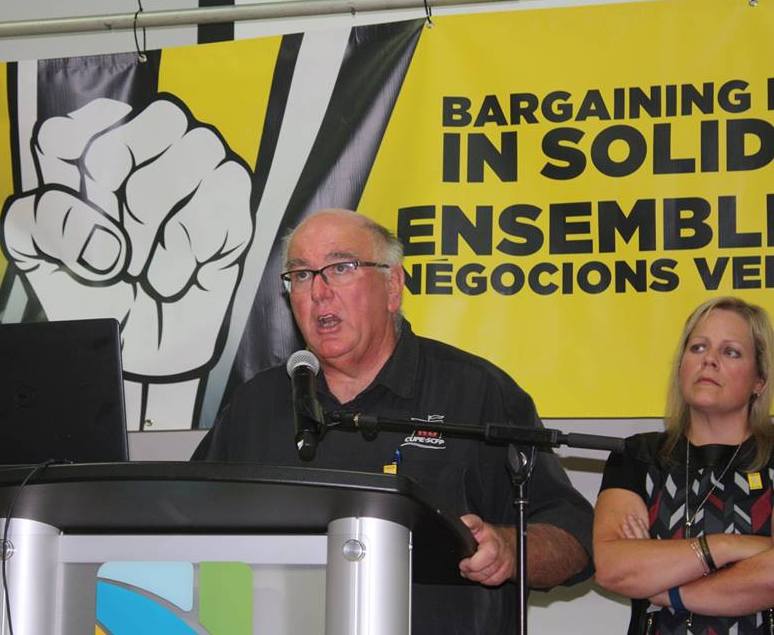 Daniel
Légère: In the last 10 years or so, we
have had two rounds of bargaining, two four-year cycles, where the
province came in with wage mandates. One round was zero per cent, zero
per cent, two per cent, two per cent, and the other one was one per
cent, one per cent, one per cent and one per
cent. Our members' wages have not kept up with the rate of inflation.
Inflation was higher than our members' wage increases. The government
came to the public sector unions and said that we are in tough economic
times so the public sector has got to do their part, tighten their
belts and help. We have been tightening our belts for 10
years. Daniel
Légère: In the last 10 years or so, we
have had two rounds of bargaining, two four-year cycles, where the
province came in with wage mandates. One round was zero per cent, zero
per cent, two per cent, two per cent, and the other one was one per
cent, one per cent, one per cent and one per
cent. Our members' wages have not kept up with the rate of inflation.
Inflation was higher than our members' wage increases. The government
came to the public sector unions and said that we are in tough economic
times so the public sector has got to do their part, tighten their
belts and help. We have been tightening our belts for 10
years.
We asked our economist to look into the fiscal reality
in New Brunswick and the relation between the cost of living and our
wage increases. We suspected that we were falling way behind in our
buying power. We investigated the facts and found out what happened to
the real buying power of our members over these years. In some cases,
our
members actually lost disposable income over the last 10 years.
One of the questions that is often asked is how come
Canadians are incurring so much debt. We know why our members are going
into debt, because when your income is shrinking in relation to the
cost
of living, and you have to pay the same bills, you have to borrow. Our
members said that we can't keep going on this way, we are fed up,
we are working short-staffed, we have a couple of sectors that are in
crisis. I
am sure you have heard about the ambulance services and in nursing
homes where there is a significant problem to fill positions because of
problems with recruitment and retention. Part of that is how you
compensate people.
In March, we had a bargaining conference, open to all
CUPE members. It was almost as big as a convention. Almost 300
CUPE members came together. We rolled out a plan for them, lots of
opportunities for input, we had lots of floor mics, we had a suggestion
box, we had a wall where they could post stuff. We got feedback all the
way through this process from our members to make sure that we are on
the right track.
 After that bargaining
conference, we started rolling this out, we adopted the clenched fist
as our symbol, the universal symbol of solidarity, defiance and
resistance. This past September, the Regional Director and I went
around the province talking to CUPE members in every corner of the
province. We had thousands and thousands of CUPE
members come out to these meetings. Again we discussed with them
whether we are on the right track, that this is the plan, this is what
we have done over the last eight months, etc. After that bargaining
conference, we started rolling this out, we adopted the clenched fist
as our symbol, the universal symbol of solidarity, defiance and
resistance. This past September, the Regional Director and I went
around the province talking to CUPE members in every corner of the
province. We had thousands and thousands of CUPE
members come out to these meetings. Again we discussed with them
whether we are on the right track, that this is the plan, this is what
we have done over the last eight months, etc.
WF: What is the next step in the
campaign?
DL: Now we are telling all the
political parties that CUPE members are fed up. We have
about 15,000 of our 30,000 members at the bargaining table
right now. By Christmas, we will have 25,000 of our 30,000
members at the table.
While the political landscape is pretty uncertain in
New Brunswick, we want all political parties to know why our members
have taken the stand they have and to put them on notice that this will
be our priority. To have 25,000 of our 30,000 members at the
bargaining table at one time is unprecedented. Our members are clear
that
the priority is wages. They want real wage increases above the cost of
living. Leading up to the election and during the election period,
bargaining has been kind of put on hold because government negotiators
did not really have a clear direction on where to go. The employers
were coming to negotiations with nothing to put on the table -- they
did not have a mandate to bargain. That was wasting our members'
resources and time. We want to be upfront with all the political
parties. When we have a real government in place, we want to be able to
achieve real wage increases for our members.
At the moment, as you may know, there are four parties
in the mix in the Legislature. The Conservatives have 22 seats, the
Liberals have 21 seats, the People's Alliance has three seats and the
Green Party has three seats. [The
Liberals are now down to 20 seats because one of their MLAs has become
the Speaker of the House since the interview was done -- WF Ed. Note.]
The
two
smaller parties are the ones who kind of hold the balance of
power right now. Everything is up in the air.
But our members are quite clear. They are willing to
take any action necessary, including job actions, to achieve real wage
increases.


WorkSafe NB Task Force's Anti-Worker Recommendations on
Workers'
Compensation System
- Interview, Patrick Colford, President,
New Brunswick Federation of Labour -
At the end of
May 2017, the New Brunswick government announced that a WorkSafeNB
Task Force was being set up to review the workers' compensation system,
with the mandate of focusing on short-term solutions and long-term
sustainability. WorkSafeNB is a Crown corporation mandated to prevent
workplace injuries and
occupational disease, as well as to provide rehabilitation services and
compensation benefits to workers who are injured or made ill on the
job. It is charged with overseeing the implementation and application
of the health and safety legislation of the province. The task force
submitted its report to the government of New Brunswick on
July 17, 2018.
Workers' Forum
asked Patrick Colford, the President of
the New Brunswick Federation of Labour, his views about the
recommendations of the Task Force and the Federation's plans since
it has serious issues with some of the main recommendations in the
report.
***
Workers' Forum: What are the views
of the Federation of Labour on the recommendations of the WorkSafeNB
Task Force?
 Patrick Colford: First,
one
has
to recall that in the early 1990s, workers gave up a lot
of benefits and a lot of concessions were introduced into the
province's workers' compensation system. That is when New Brunswick
introduced the three-day waiting period, when we went from 90 per cent
wage recovery down to 80 per cent, as well as a whole host of other
claw-backs. At that time, the reasoning presented for doing this was
that the system was under-funded, well below 100 per cent. Over the
years, that funding got back to 110-125 per cent but instead of
reversing the concessions that were made, they gave rebates to the
employers. We have been asking for a long time now for balance to be
restored in the system and that is what we were advocating for this
task force to do. Patrick Colford: First,
one
has
to recall that in the early 1990s, workers gave up a lot
of benefits and a lot of concessions were introduced into the
province's workers' compensation system. That is when New Brunswick
introduced the three-day waiting period, when we went from 90 per cent
wage recovery down to 80 per cent, as well as a whole host of other
claw-backs. At that time, the reasoning presented for doing this was
that the system was under-funded, well below 100 per cent. Over the
years, that funding got back to 110-125 per cent but instead of
reversing the concessions that were made, they gave rebates to the
employers. We have been asking for a long time now for balance to be
restored in the system and that is what we were advocating for this
task force to do.
The main recommendation of the task force that we really
have an issue with is doing away with the Appeals Tribunal. WorkSafeNB
is trying to create policies that supersede the legislation. Through
this task force they want to give more power to the New Brunswick Board
itself over the Appeals Tribunal. If workers have a WorkSafeNB claim
and it is being denied, they can go to appeal. What happens is that in
these appeals, I think in around 90 per cent of them, the decisions are
being overturned in favour of the worker. WorkSafeNB is saying that it
has a problem with the Appeals Tribunal overturning these decisions.
They are basically asking the government to introduce legislation that
will allow them to make their own policies that will supersede the
legislation. One of the recommendations of the task force is that
"WorkSafeNB be the final authority on benefit entitlement." Basically,
if the Appeals Tribunal makes a recommendation which favours the
worker, that they are entitled to those benefits, at the end of the day
WorkSafeNB wants to be able to come back and say no. We have a huge
problem with that. Essentially it is doing away with the Appeals
Tribunal. Why bother to have an Appeals Tribunal if WorkSafeNB is the
final authority on benefits?
The other recommendation we
have a major issue with is mandating WorkSafeNB to "review annually the
Grand Bay Rehabilitation Centre, comparing service delivery options and
results to those in other jurisdictions, and publicizing these
comparisons." Right now, in New Brunswick, if you are injured and need
to go to a rehabilitation centre,
there is one run by WorkSafeNB. It is a publicly-funded
institution, and they want to compare the service delivery options and
be able to privatize those. Instead of saying, "Okay, you are going to
Grand Bay," they will be able to send you to a private physiotherapist,
somewhere else. It undermines a precious asset that New Brunswick has.
We are one of the only jurisdictions, if not the only one in
Canada, that actually has a publicly-funded public rehabilitation
centre. You are able to get your rehabilitation in a one-stop shop.
Definitely this is a privatization measure that is being introduced and
it is huge.
WF: What is the Federation of
Labour's plan of action regarding this issue?
PC: We are going to launch a
campaign around the task force and WorkSafeNB to lobby whatever
government is set up in New Brunswick to make sure that such
recommendations never see the light of the day. We are going to lobby
hard because they are not good for workers and they are not good for
anybody. They continue to tilt the scale in favour of employers and not
employees
who are injured, maimed or killed on the job. Nobody gets up in the
morning and kisses the family goodbye expecting to never see them
again. The
campaign is going to be both a major lobby effort by the Federation and
a massive public awareness campaign to get the public on side.
Basically everybody either has been directly affected or knows somebody
who
has been affected by WorkSafeNB. We believe that this is
something that has a place in the hearts of the people of New Brunswick.
We are calling on everybody to do anything that they
can to help and advocate for better compensation across Canada. If is
it going to happen in New Brunswick, I guarantee that other right-wing
political parties will see the opportunity to put in their own
legislation similar to this one.

Letter to the Editor
Re: Workers' Forum Article on Pilot Fatigue

On reading the October 18 Workers' Forum article, "Canadian
Airline Pilots Step Up Campaign for Fatigue Reduction Measures" I found
it interesting that Transport Minister
Marc Garneau, who worked with NASA in the U.S., has not acted to ensure
its science-based findings and recommendations are followed for health
and safety of pilots, passengers, crew and anyone else affected when
fatigue comes into play. Instead he seems content for Canada to have
some of the lowest standards in the world because airline companies'
commercial considerations supersede health and safety. Pretty egregious
and
dangerous example of Liberal hypocrisy.

PREVIOUS
ISSUES | HOME
Website:
www.cpcml.ca
Email:
office@cpcml.ca
|

